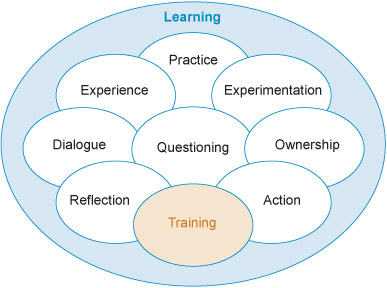2.2 A broader scope of learning
All these developments and contextual factors are contributing to a move away from the assumption that formal, usually classroom-based, training solutions are the best approach to learning and talent development, and towards exploring alternative approaches that both enable and rely on learners making their own connections between theory and practice, and some of their own decisions about their development priorities. The shift from training to learning – from skills to skilfulness – has quite profound implications for the scope of HRD work in this area. It means, for instance, that the TNA is only one tool in a broader suite of methods for articulating learning needs and designing and facilitating learning interventions (see Figure 2). Many educational theorists have started using the idea of a ‘learning needs analysis’ (LNA) to encompass this broader range. The notion of a LNA will be the focus of the next activity.
Activity 2: From training to learning
Return to your reflective notes on TNAs from Activity 1.
In the text box below, write down the ways in which doing an LNA (learning needs analysis) might be different from doing a TNA (training needs analysis). In what ways might your choice of delivery method, your approach to evaluation or your approach to stakeholder engagement change if the focus is on learning, rather than training? Note down the implications of any differences for:
- a.your role as an HRD professional
- b.the organisational members whose learning needs you are assessing
- c.the organisation.
Feedback
The key learning point to be derived from this exercise is that the increased agency of learners is likely to result in decreased control for HRD professionals, and hence the organisation. This decrease in control relates both to the identification of needs, and to the proposed ways of tackling these needs. Although critical and experiential theorists love the shift from training to learning, from skills to skilfulness, etc., the practical and political dynamics of organisational life mean that it might not always be viable. Organisational stakeholders may not embrace the self-managing, self-monitoring aspects of the (empowered) learning discourse, however attractive the rhetoric of ‘the learning organisation’. Two areas that get more complex (and hence require more nuanced work on the part of HRD professionals) as we move from training to learning are: facilitation and evaluation.
Within this context of increasing emphasis on self-directed learning, coaching and mentoring have become rather popular tools. The CIPD/Cornerstone OnDemand Learning and Development 2014 annual survey (CIPD, 2014) questioned 1000 learning and development UK professionals and reported that 76 per cent of organisations now provide coaching and mentoring; this figure rises to 85 per cent in the public sector. The survey also reported that coaching is perceived by HR professionals as the most effective way to deliver learning and development, and that half of those questioned intend to introduce coaching in the near future. It is also interesting to note that coaching is seen as more effective at present than other kinds of provision including emerging technological provision such as e-learning and MOOCs (CIPD, 2014, p. 8).
Both coaching and mentoring are ways of facilitating and supporting self-managed learning. In the next section we will introduce some basic ideas around coaching and mentoring and give you the opportunity to practise some foundation coaching skills.

